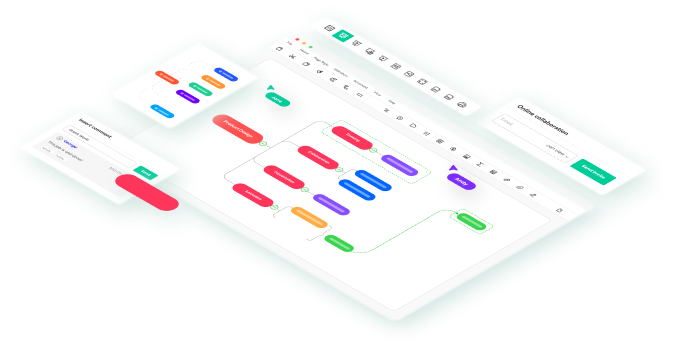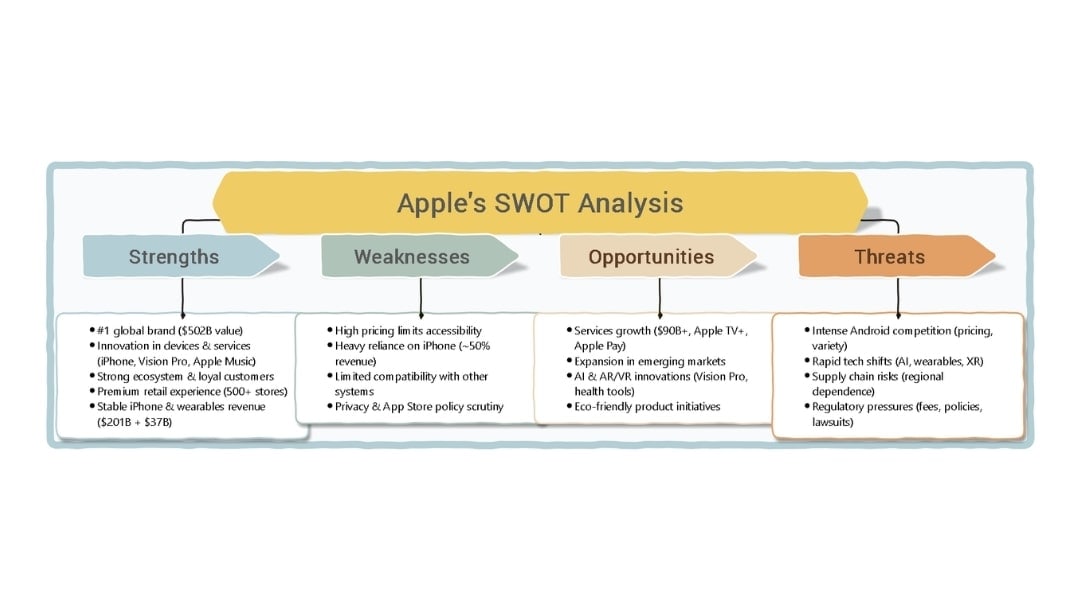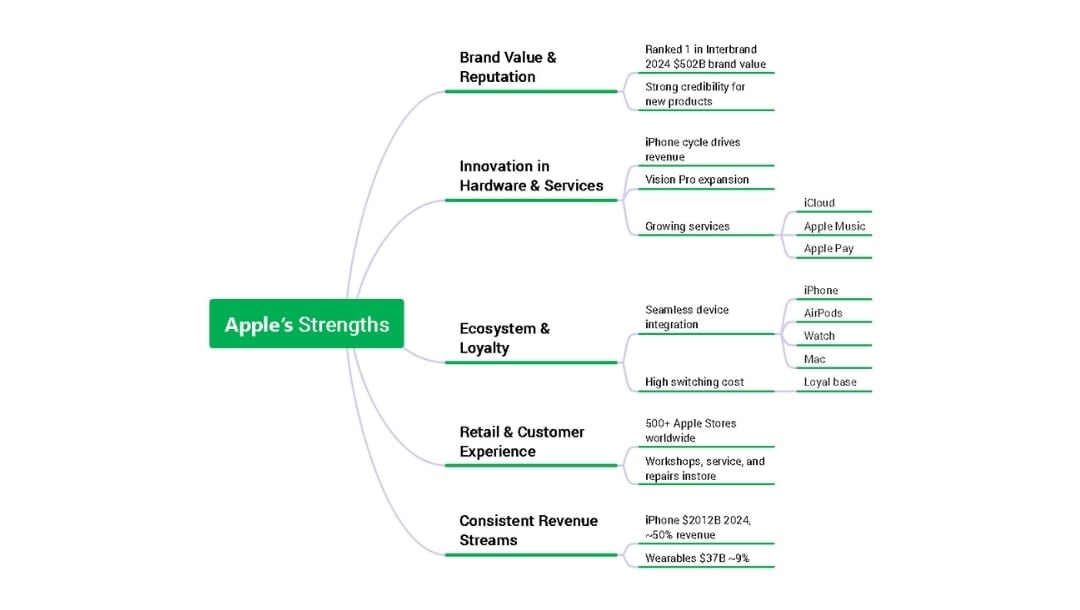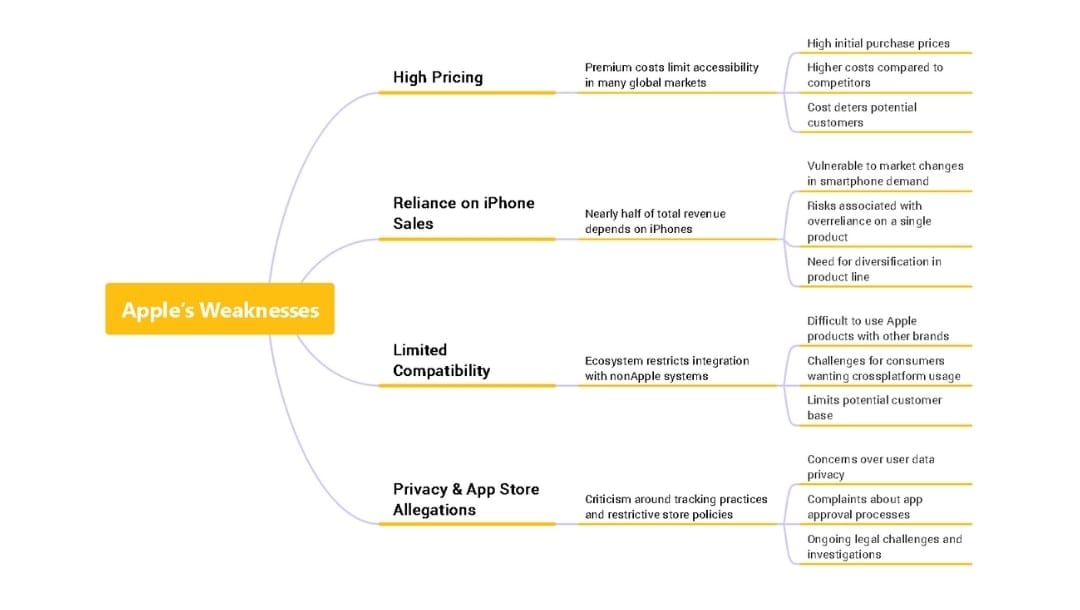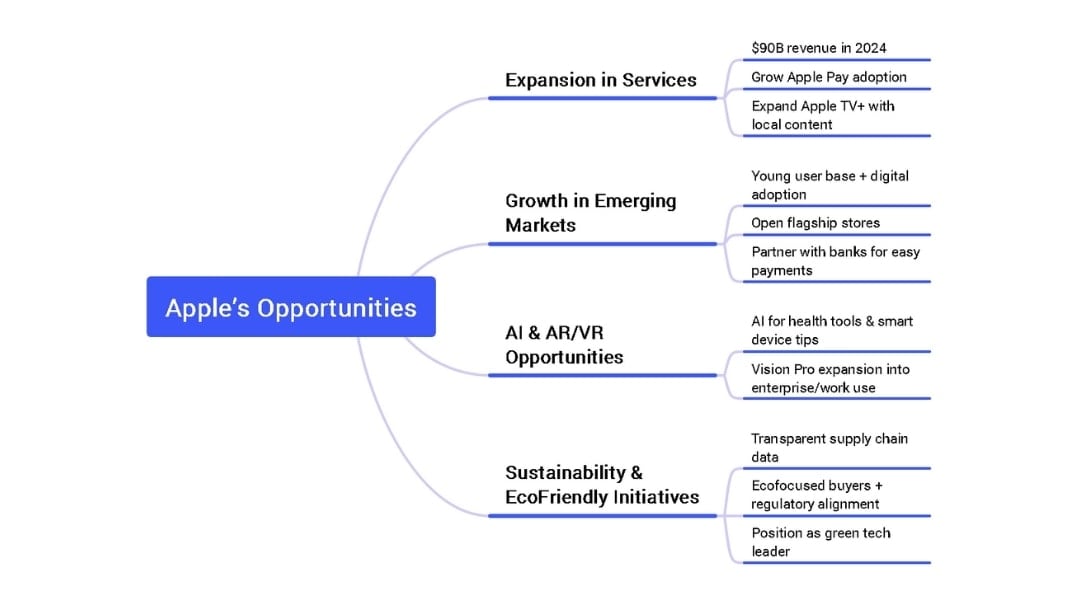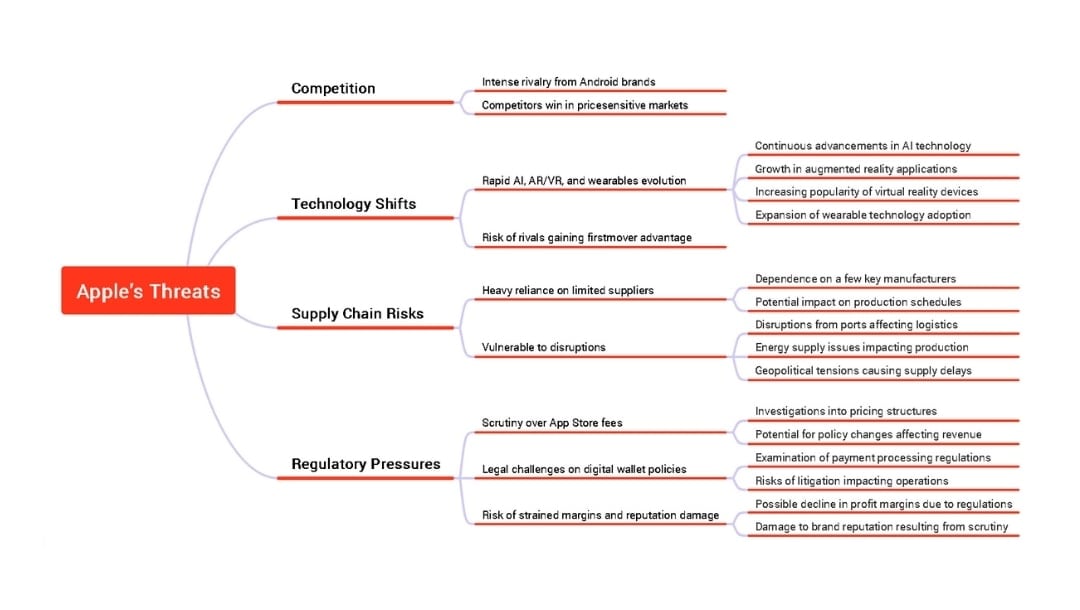SWOT analysis of Apple highlights how the company balances innovation with market pressures. It shows where Apple thrives, where it struggles, and the external forces shaping its future.
I've often applied SWOT to leading tech brands, and Apple offers one of the best cases. It isn't only about premium devices but also about sustaining growth in services and managing global challenges.
I wrote this article to cut through lengthy reports and present verifiable observations you can use immediately.
In this article
Apple Inc. Overview
Founded: Apple began on 1 April 1976, when Steve Jobs, Steve Wozniak, and Ronald Wayne opened a shop in a garage.
Headquarters: Based in Cupertino, California, the company remains rooted in Silicon Valley.
Annual Revenue (2024): Apple posted $391.04 billion in fiscal year 2024, with modest growth of about 2 % from the prior year.
Market Cap (2024): By the end of 2024, Apple's market capitalization rested at approximately $3.79 trillion.
Key Products: The main offerings include the iPhone line, iPad models, Mac computers, Apple Watch, and Core services like the App Store and iCloud.
Employees: As of late September 2024, Apple employed roughly 164,000 full-time people globally, a 1.86 % rise from the previous year.
Latest Growth (YoY %): Annual revenue has grown approximately 02% from 2023. Headcount rose 01.86% year-over-year.
Official Websites: Financial reports and updates: Apple Investor Relations; https://www.apple.com/
Apple's SWOT Analysis: Key Parts
Apple's Strengths
Brand Value And Global Reputation
Apple ranks 1st in Interbrand's 2024 Best Global Brands, valued at $502 billion. It reflects trust and pricing power.
The brand name itself gives Apple credibility when entering new product categories.
Innovation In Hardware And Services
Apple's strategy emphasizes innovation. The annual iPhone cycle secures substantial revenue.
Products like the Vision Pro show risk-taking in new categories. Services, including iCloud, Apple Music, and Apple Pay, add a steady recurring income.
Strong Ecosystem And Loyal Customer Base
Apple devices connect seamlessly. AirPods pair with iPhone, and Apple Watch syncs health data. Macs integrate through Continuity Camera.
This ecosystem enhances loyalty and reduces switching. Customers often expand their device use to enhance their overall experience.
Premium Retail Experience
Apple operates over 500 stores worldwide. These serve as sales points, service hubs, and learning centers. Customers test products, attend workshops, and get repairs.
This hands-on experience strengthens brand trust in ways online competitors cannot match.
Consistent Revenue From iPhone And Wearables
In FY 2024, iPhone sales exceeded $201.2 billion, about half of Apple's total. Wearables contributed $37 billion, representing approximately 9% of the total.
Together, they ensure stable growth across product lines.
Apple's Weaknesses
High Pricing Limits Accessibility
Apple charges premium prices across its lineup. Even budget models exceed competitors. While this builds high margins, it also restricts accessibility in many global markets.
Heavy Reliance on iPhone Sales
About half of Apple's revenue still depends on iPhones. A dip in demand immediately impacts results. While other products grow, they cannot yet balance this reliance.
Limited Compatibility With Other Systems
Apple's ecosystem limits easy integration. Its unique hardware and iOS-focused apps reduce compatibility. It creates extra cost and effort for organizations with mixed platforms.
Allegations Around User Privacy And App Store Policies
Apple promotes privacy but continues to face challenges. Allegations range from tracking practices to app store rules. These spark debates and draw the attention of regulators.
Apple's Opportunities
Expansion In Services
Apple's services brought in over $90 billion in 2024. It helps when device sales slow down. Adding Apple Pay in more countries and expanding Apple TV+ in local languages can bring strong growth.
Growth In Emerging Markets
Emerging markets have young users and fast digital growth. Apple can partner with banks to facilitate easy payments and open flagship stores. After that, promoting services like iCloud becomes simple.
AI And AR/VR Product Opportunities
AI can make devices more useful by providing health tools on a Watch or offering smart tips on an iPhone. Vision Pro can go beyond fun to become a tool for work, giving Apple a new role in business.
Sustainability And Eco-Friendly Product Initiatives
Eco efforts matter for both rules and buyers. Apple can improve by showing supply chain data and progress. It creates trust and helps win customers who value sustainability.
Apple's Threats
Intense Competition From Android
Various Android brands compete with a variety of Apple products in terms of speed and lower prices. Their approach works in markets where Apple's higher pricing limits adoption.
Relying only on hardware is not enough. To respond, Apple must focus on its ecosystem and services.
Rapid Tech Changes
AI, wearables, and immersive devices are changing market rules. If Apple loses speed, rivals can create a first-mover advantage.
To prevent this, investing in rapid research cycles and trial launches in small markets can help.
Supply Chain Vulnerabilities
Apple sources key components from some specific regions. Even minor disruptions, such as port closures or energy shortages, can cause significant production setbacks.
Heavy dependence on a concentrated supplier base keeps this risk significant. Diversification and long-term contracts can mitigate such risks.
Regulatory Pressures
Apple's business practices attract global scrutiny. App store fees and digital wallet policies face legal challenges across countries. These disputes strain resources and cut into margins.
Openness in policy and flexible pricing may relieve pressure and sustain trust.
Practical Tips for a Better SWOT Analysis
Use Reliable Sources
Begin by reviewing official reports, regulatory filings, market research, and customer surveys.
I pull numbers from company filings, industry reports, and a recent customer survey before I add any claim.
Compare With Competitors
Create a short competitor table with 4–6 metrics: market share, price points, feature gaps, and product cadence. Fill the table first, then map where you stand.
Separate Internal And External Factors
Be clear: strengths and weaknesses come from inside the company, while the market shapes opportunities and threats.
Trim For Clarity
Limit the analysis to 12–16 lines total. Group similar items and use a one-sentence rationale after each group when needed.
Rank By Priority
Not every point has the same weight. Highlight the ones with the most significant impact first.
Link Insights To Actions
Don't just describe the issue. Add the next step, such as diversifying products, if heavy reliance is a weakness.
Get Multiple Views
Bring in feedback from teams like finance, sales, or operations. It makes the analysis more balanced and practical.
Keep It Updated
Schedule quarterly quick checks and one full annual review. Keep dated exports to track changes over time.
How to Make a SWOT Analysis for Apple in EdrawMind?
A SWOT analysis is easier to apply when internal and external factors are visualized. The right SWOT making tool saves time and ensures it's helpful for rational decision-making.
Here’s how I used Wondershare EdrawMind, a free tool for creating SWOT diagrams and more.
Steps to Make a SWOT Analysis
Step 1 Start With A SWOT Template
Open EdrawMind and search for "SWOT ANALYSIS" in the Gallery.
Scroll through options and review layouts: quadrant, circular, matrix.
Quadrant layouts are simple, whereas circular or matrix layouts are visually useful for presentations.
Duplicate the suitable template to start editing.
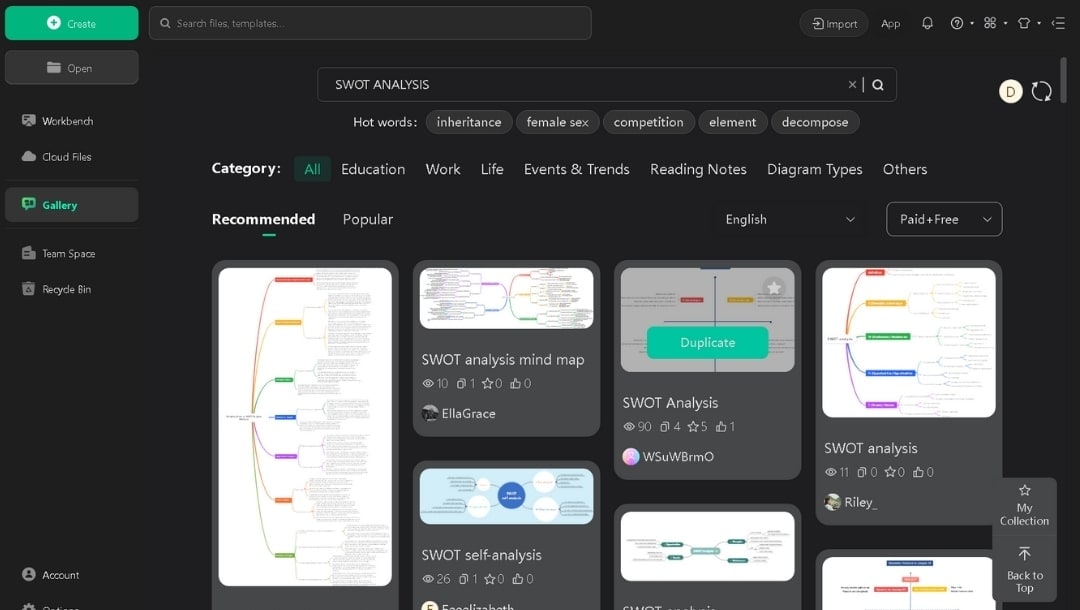
Step 2 Add Apple's Data
Double-click each node to enter Apple's data into the placeholders.
- Strengths: brand, ecosystem, innovation, etc.
- Weaknesses: pricing, reliance on iPhone.
- Opportunities: services, AI, emerging markets.
- Threats: Android, supply chain, regulations.
Use concise bullet notes instead of long text.
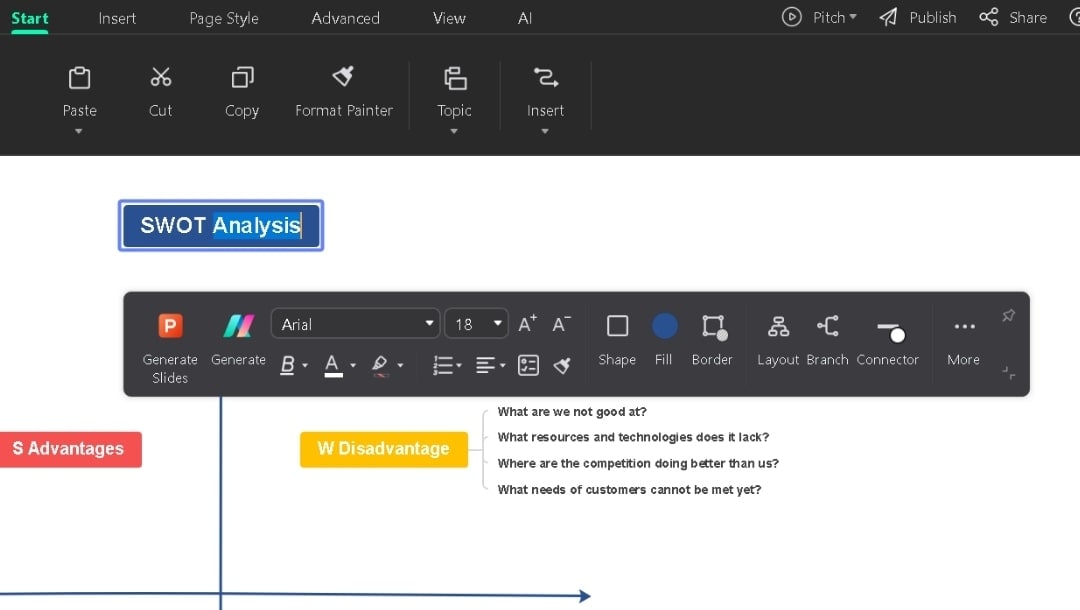
Step 3 Make It Readable
Select any item to access the pop-up menu.
Align the items, modify fonts, adjust the layout, and refine the design.
Apply quick themes directly from the side panel.
Use consistent colors: green, red, blue, and yellow for each SWOT area.
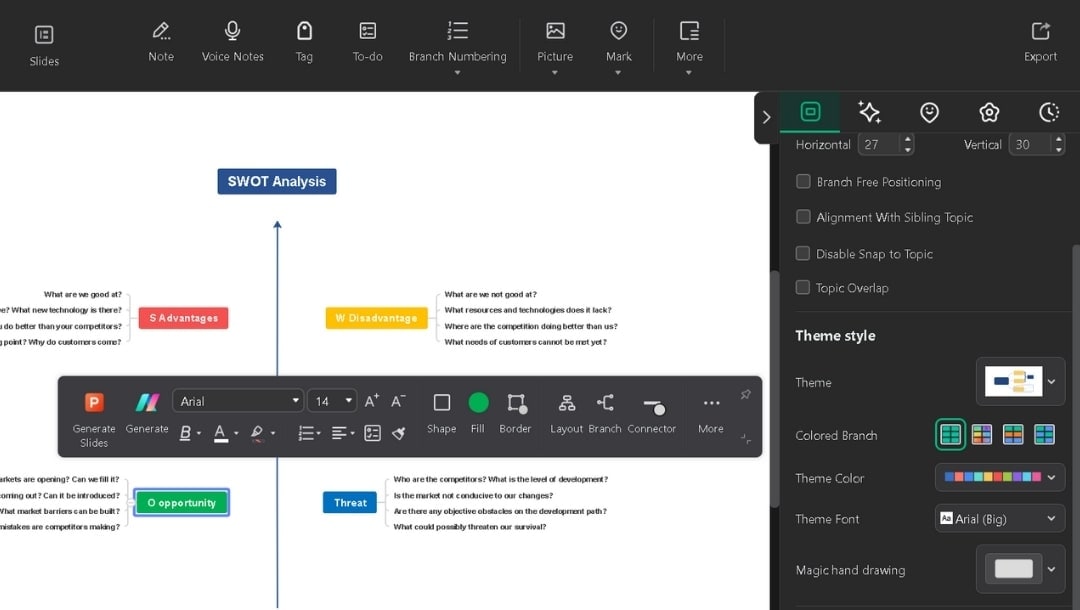
Step 4 Export Or Hand Off
Hit the Export button in the upper right corner and choose the required settings.
Export to PDF, PNG, or JPG for reports and slides.
Click the Share button to create a live, editable link for real-time feedback and collaboration.
Keep editable and exported files to ensure smooth updates.
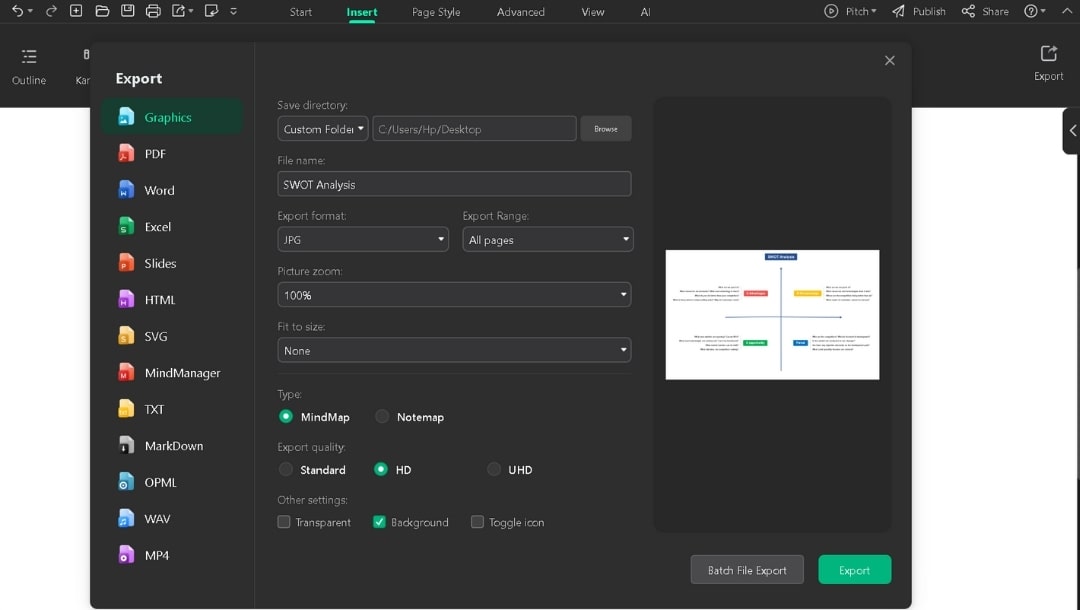
Final Thoughts
Apple's SWOT Analysis underlines a dual reality: its brand power and innovation pipeline maintain leadership, but high pricing and limited integration create weak spots. While competition intensifies, areas such as services, AR, and eco-friendly initiatives leave room for growth.
If you want to apply SWOT analysis in practice, keeping the framework visual helps avoid long lists that get ignored.
I recommend trying EdrawMind for this. It comes with hundreds of professional SWOT templates that allow you to plug in your data and transform scattered insights into a strategic visual.
FAQs
-
What Are The Social Factors Affecting Apple?
Apple's performance varies by income.
Urban buyers with higher incomes purchase premium devices; lower-income groups lean toward alternatives.
Culture and language affect services.
Concerns about working conditions, data privacy, and sustainability influence consumer choices and attract regulatory oversight. -
What Country Is Apple's Biggest Customer?
Apple earns the most in the Americas. Within this region, the United States is the largest market. -
How Does Apple Maintain Customer Loyalty?
Apple maintains customer loyalty through integrated products and daily services. OS updates, trade-ins, and bundles keep users engaged.
These services add recurring revenue and reduce switching. -
How Can Businesses Apply Apple's SWOT Analysis To Their Own Strategy?
Start by listing internal and external factors.
Rank them by effect and urgency.
Assign ownership and define one action for key items.
Review each quarter and track results with a single KPI. -
Who Is Apple's Biggest Competitor?
Samsung and other Android makers rival Apple in the number of devices they offer. Google and Microsoft compete in services like search and cloud.
Competition must be tracked across both.
References
- https://interbrand.com/best-global-brands/
- https://investor.apple.com/investor-relations/default.aspx
- https://www.macrotrends.net/stocks/charts/AAPL/apple/revenue
- https://stockanalysis.com/stocks/aapl/employees/
- https://www.macrotrends.net/stocks/charts/AAPL/apple/market-cap



